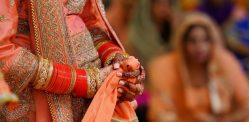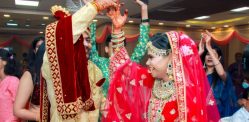"It's not 'a phase', as my auntie has said for 20 years"
South Asian women choosing not to marry deviates from socio-cultural norms and expectations. Indeed, the institution of marriage has long been a cornerstone in South Asian cultures.
Within Desi cultures and families, there is an ideal that marriage will inevitably occur for all women from, for example, Pakistani, Indian, Bangladeshi and Nepalese backgrounds.
However, shifts are occurring among South Asian women in Asia and the diaspora, with some choosing to delay or forgo marriage.
The shifts raise questions about societal expectations, individual agency, and evolving priorities.
It also raises the question of whether women’s perceptions and understanding of marriage have changed.
DESIblitz looks at why some South Asian women are choosing not to marry.
Rejection of Patriarchy and Marriage as Necessary

Traditionally, in Desi communities, marriage is considered a rite of passage for Desi women. Families often encouraged women to marry young and have children.
Women are now increasingly challenging the idea that marriage is necessary for a fulfilling life and are choosing not to marry or delaying it.
The perception of marriage has evolved, with some viewing it as an optional rather than an essential milestone.
Sreemoyee Piu Kundu, author and founder of Status Single, a Facebook community for urban single women in India, stated:
“I meet a lot of women who say they are single by choice; they reject the notion of marriage because it’s a patriarchal institution that’s unjust to women and used to oppress them.”
For some Desi women, the choice not to marry is a pushback against patriarchal ideals and traditions and a desire not to sacrifice oneself.
Sreemoyee said she saw “many more women now who are single by choice, not just by circumstances”. For her, this “changing face of singlehood” needs to be recognised.
Moreover, 44-year-old British Pakistani Alia told DESIblitz:
“More and more, it’s seen as a choice, especially for Asian women in the West and some cities and families back home.
“I can’t see myself ever marrying; I don’t want the compromises I’d have to make or possible headaches.”
“I am very happy being single; I don’t feel I am missing anything. It’s not ‘a phase’, as my auntie has said for 20 years.
“Some judge and think I’m strange, but I don’t care. Yes, most still expect marriage, but it isn’t for everyone.
“If you’re financially secure, happy and have family support, it’s a non-issue. The last one is more important back home.”
Alia feels able to confidently place her autonomy and self-fulfilment above traditional expectations around getting married.
Women embracing being single and not wanting to marry, even when they face judgment, shows a shift.
It signals a shift from viewing marriage as an obligation to embracing singlehood or a non-marital status as a legitimate lifestyle choice and focusing on personal wants and needs.
Educational and Career Aspirations

Women today often prioritise education and careers.
Education provides opportunities beyond traditional roles, enabling women to explore diverse career paths.
Many women now pursue advanced degrees and professions, resulting in decisions to delay marriage. For some, it makes marriage less of a priority and, for others, undesirable.
Shivani Bose, based in India, maintained:
“More and more Indian women are approaching marriage with a discerning eye, prioritising personal aspirations and delaying or opting out altogether.
“This isn’t a rejection of love or companionship but a conscious choice to redefine what marriage means in their lives.
“Women are pursuing higher degrees, establishing successful careers, and delaying marriage to focus on professional goals.
“The pressure to settle down at a young age is giving way to the pursuit of personal ambitions.”
For some, this delay can lead to a permanent choice to remain unmarried, as career aspirations and personal needs are focused on.
Moreover, British Bangladeshi Shareen* said:
“I’m 30 and happily not married. I’ve never wanted biological kids and always wanted to adopt, so I don’t need to marry.
“I want to focus on finishing my postgraduate degree and then buying my house. I have a good job and am confident in raising a child myself.
“Honestly, don’t feel the need to marry. I’ve been waiting to feel it, but nothing.”
Shareen’s decision to embrace single parenthood challenges the traditional belief that marriage is essential for raising children. By focusing on education, career, and home-ownership, Shareen focuses on what fulfilment means for her.
Desire to Prioritise Personal Well-Being

Some South Asian women are prioritising personal well-being and growth over societal expectations of marriage. This decision stems from the desire to cultivate self-fulfilment, mental health, and individual identity.
Alia told DESIblitz:
“I’m not saying every woman I know who is married is unhappy. But many have made sacrifices and do a lot of emotional work.
“I didn’t want that. I’ve seen happy and bad marriages.
“I’ve never felt the need to marry, and I’m financially in a position due to my father and my work that I can live comfortably solo.
“It might sound selfish, but I can prioritise my well-being and development in a way my married friends and family who are women can’t.
“Fifty years ago, could I have done this, made this choice? I don’t know. It would have been harder, even with my father’s support.
“The judgements and questions of why I’m not married are less severe now and easier to shrug off for me, at least.
“By not marrying, I can focus on me, my parents, siblings, nephews and nieces. I travel when I want.”
For Alia, remaining single empowers her to focus on family, career, and self-care, which makes her happy.
The reduced stigma in some spaces surrounding permanently unmarried or single Desi women encourages more to pursue individual happiness and non-traditional life paths.
Desi women are challenging the idea that marriage is necessary or that every woman desires it.
South Asian women’s choice not to marry represents a broader shift. This decision highlights, in part, changing priorities and perceptions.
For some, focusing on education, financial independence, and mental well-being is more important.
From the UK to India and elsewhere, women are challenging patriarchal structures and redefining their roles in society and families.
Women like Alia and Shareen are challenging socio-cultural traditions and ideals by confidently embracing the fact that marriage is not on their list of wants.
The decision of some South Asian women not to marry reflects evolving attitudes towards marriage, autonomy, and self-fulfilment.
Factors like education, career aspirations, and personal well-being are reshaping how women view their life paths.
As more women redefine fulfilment, the narrative around marriage is shifting from a socio-cultural expectation to a personal choice.






























































